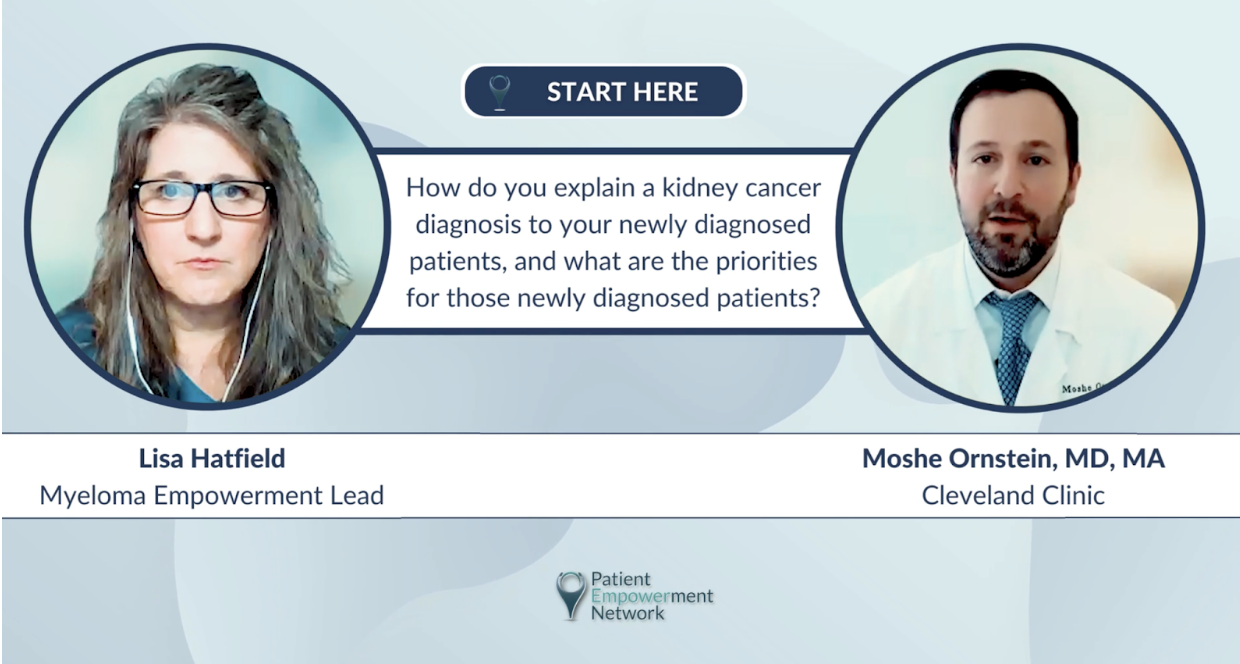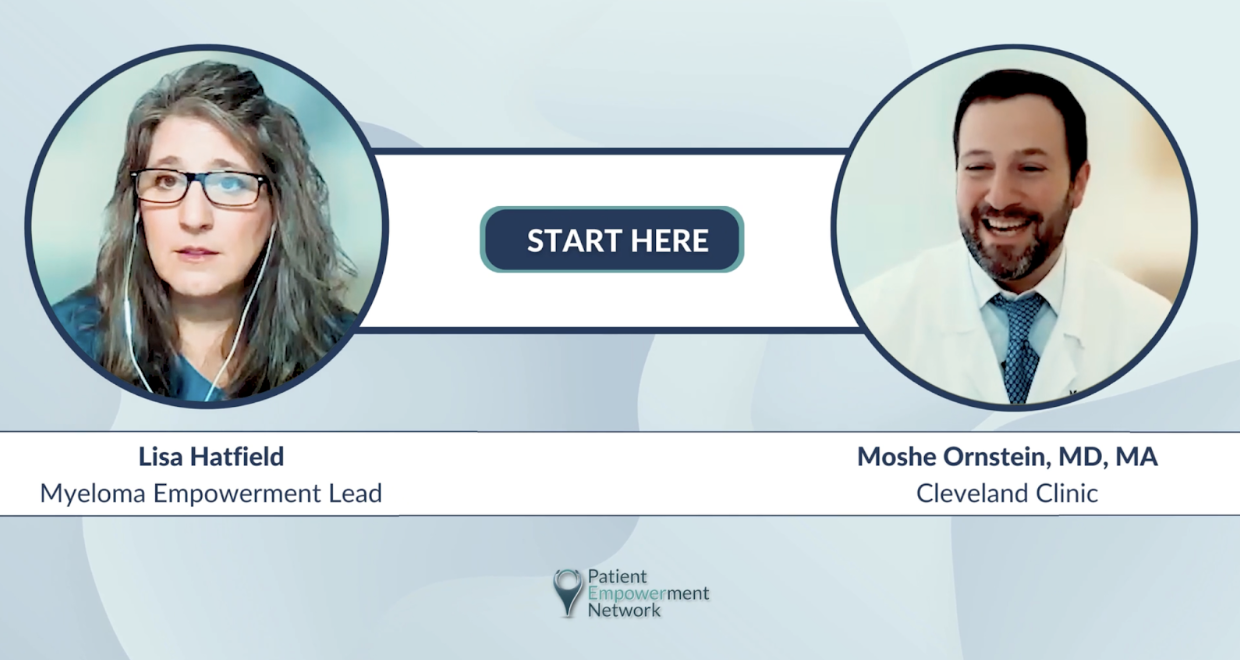Empowering Patients Facing a Renal Cell Carcinoma Diagnosis
Renal cell carcinoma (RCC), commonly referred to as kidney cancer, may present itself to patients as daunting and multifaceted. What proactive measures can patients and their caregivers implement to optimize their care experience? With this idea in mind, the Patient Empowerment Network initiated the START HERE Renal Cell Carcinoma program, which aims to close the gap in the expert and patient voice to build empowerment.

Patient-Expert Q&A Webinar Topics and Key Takeaways
In the Patient-Expert Q&A webinar, kidney cancer expert Dr. Moshe Ornstein shared his expertise to help patients and care partners boost their knowledge and confidence. Cancer patient and Empowerment Lead Lisa Hatfield moderated the discussions and shared some of her perspectives as a patient. Some of the discussion covered:
- Kidney Cancer Patient Expert Q&A: Dr. Moshe Ornstein
- Diagnosed with Renal Cell Carcinoma? Start Here
- Exploring Renal Cell Carcinoma Research: Expert Insights on Immunotherapy and Targeted Therapy
- Renal Cell Carcinoma Clinical Trials | A Deep Dive into the Latest Advancements
- Expert Insights into Kidney Cancer Risk Factors and Genetic Testing
- How Is Advanced Renal Cell Carcinoma Patient Care Managed?
- Kidney Cancer Patient Expert Q&A: Start Here Resource Guide
Kidney cancer diagnosis breaks down into two main categories. Dr. Ornstein detailed the two types. “There is the patient that presents with a localized kidney cancer. So they came to the emergency room because they were having belly pain, and they were found to have a big mass growing in their kidney that is proven to be kidney cancer. And then there’s the patient who has advanced disease, metastatic disease that has spread beyond the kidney. Either they came in with metastatic disease, in other words, their kidneys in place, and they have cancer beyond the kidney. Or they already had a surgery a year or two ago, and now they come back, and the cancer has returned elsewhere in the body.”
Preparing patients for their cancer journey is top of mind for Dr. Ornstein, and he discussed how he approaches this preparation for the main types of patients. “We talk about what kind of surveillance, what kind of watching or monitoring of the cancer are we going to do, how often they’re going to get CAT scans. So really try to give them the big picture about what cancer they have, what the outlook is, and what we’re going to do to keep a close eye on them. For the patient who has an advanced cancer, in some ways it’s similar. When I say advanced, I mean a cancer that has spread beyond the kidney that’s going to require therapy, immunotherapy, targeted therapy, a clinical trial, whatever it might be.”
Some kidney cancer patients may wonder or even feel remorse over what caused them to get cancer. Dr. Ornstein explained that even though the cause isn’t always known, there are some known risk factors like asbestos, some types of gasoline exposure, and secondhand smoke. Dr. Ornstein also shared, “We do have known risk factors for kidney cancer, whether it’s obesity, smoking, high blood pressure, chronic kidney disease. So there are certain risk factors and associations, but it’s really difficult for a specific patient to be able to pinpoint this caused the kidney cancer. And I think it’s reassuring for patients to know that as a general rule, it’s not something that a patient did that caused the kidney cancer, and it’s not somebody’s fault that they have the kidney cancer.”
Although some kidney cancer patients will be monitored with imaging scans rather than starting treatment right away, Dr. Ornstein shared that the vast majority will start treatment as soon as possible. “…probably 95 percent of these patients are going to get an immunotherapy-based combination as their first line of treatment. Immunotherapy has different names in the literature. You might see immunotherapy, you might see checkpoint inhibitors. But what these are doing is they’re “releasing the brakes” on the body’s own immune system to attack the cancer. So the immunotherapy is either given in combination with another immunotherapy.”

Kidney cancer clinical trials generally fall into one of two buckets. Dr. Ornstein explained that one bucket is comprised of clinical trials that are investigating novel therapies. He explained further about the second bucket of clinical trials. “…And the other class of clinical trials is really sort of optimizing the drugs we already have. So we know that as a general rule, giving immunotherapy plus targeted therapy is better than giving immunotherapy alone. But what about trials looking at giving two immunotherapies plus a targeted therapy? We know that patients either get immunotherapy and immunotherapy, or an immunotherapy and a targeted therapy. What about if we gave two immunotherapies and a targeted therapy? Can three be better than two? So there are trials both in the front-line setting and in the refractory setting, looking at these novel therapies in the one bucket. And then there are also trials looking at these combinations and different ways of mixing and matching therapies that we already have to optimize patient outcomes.”
It’s an exciting time with new kidney cancer therapies, and these are just some of the main takeaways from the Renal Cell Carcinoma Patient-Expert Q&A webinar. We hope you can use these valuable kidney cancer resources to build your knowledge and confidence toward becoming a more empowered patient or care partner.
START HERE Renal Cell Carcinoma Program Resources
The program series includes the following resources:
- START HERE Patient-Expert Q&A Webinar & Segments featuring Dr. Moshe Ornstein
- Your START HERE 90-Day Plan personalized 90-day patient plan with resources from trusted advocacy partners
- START HERE Resources that feature PEN text alerts to receive personalized support, blogs, and downloadable guides



